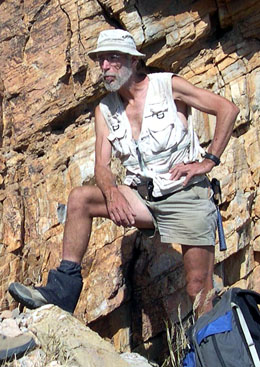Indiana Jones and the snowball of doom

The Indiana Jones of Geology will arrive in St Andrews next week, fresh from field work in the wilds of Namibia, to deliver a lecture explaining how discoveries as disparate as marine fossils and the thermonuclear reactions that power stars have shaped our understanding of climate change.
Professor Paul Hoffman of the University of Victoria, father of the Snowball Earth Hypothesis, will deliver his lecture – Climate Science and Geology: A Tale of Three Histories – as part of the University of St Andrews’ 600th Anniversary Lecture Series. The event will take place on Wednesday September 26, 2012 at 1715 hours in the Medical Sciences Building Lecture Theatre, North Haugh, St Andrews. Attendance is free and all are welcome. The lecture will be followed by a free drinks reception.
In a dual role as science historian and historical scientist; Professor Hoffman will explain the origins of geology and glaciology, and their relationship to the cultural and political movements of post-Enlightenment Scotland and continental Europe.
Professor Hoffman will present an account of how the study of climate change is rooted in Geology; building on the research that led to his Snowball Earth model that explains how, some 600 million years ago, Earth experienced repeated episodes of global glaciations that entombed the world’s oceans in a carapace of sea ice for millions of years. Studying this ancient catastrophe has enabled scientists to learn important lessons about earth’s descent into and recovery from climatic extremes – valuable for today’s debates regarding future climate change.
Speaking ahead of his lecture Professor Hoffman said:
“Although physicists developed a comprehensive understanding of the earth’s climate system without reference to geology, geological discoveries played a pivotal role in the emergence of theories of global climate change. With reference to original papers we can trace the sometimes amusing interactions between physicists and geologists that led to fundamental concepts in global climate change.”
Professor Hoffman has received numerous awards for his work including election to the Royal Society of Canada, the US National Academy of Sciences and the American Academy of Sciences as well as the Alfred Wegener, Henno Martin, Logan, Miller, Douglas, Penrose and Wollaston Medals from professional societies in Europe, Africa and North America. Earlier this year he was made an Officer of the Order of Canada.
Notes to News Editors
The University of St Andrews 600th Anniversary will span three calendar years from 2011 to 2013. It will mark the formal charter granted by Bishop Henry Wardlaw in February 1411 and the achievement of full university status conferred by Pope Benedict XIII by Papal Bull in 1413.
The University of St Andrews’ 600th Anniversary Campaign was launched on February 25, 2011 by St Andrews alumnus and Campaign Patron Prince William.
The anniversary campaign is a £100m philanthropic fundraising appeal. The Appeal will lay the foundations for a seventh century of exploration and allow the University to continue to invest in people, ideas and excellence.
One of the projects that the appeal hopes to fund is a St Andrews Sustainability Institute – which will continue to advance our understanding of climate change, and help to answer the global challenges we all face.
Category University news